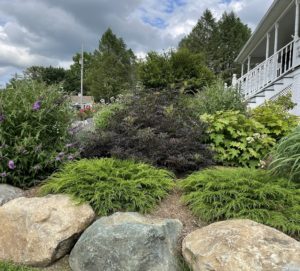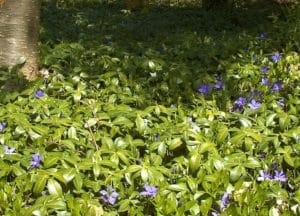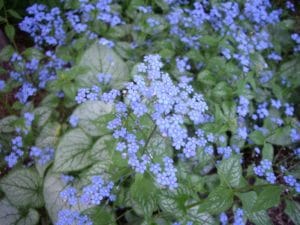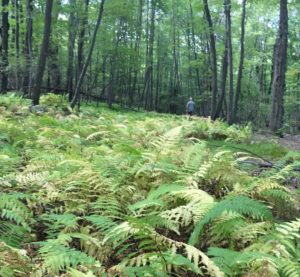Hello fellow readers, Last week’s chat about remedies of carpenter ants and termites in mulch brings to mind the best solution of all. Plant mulch alternatives instead—groundcovers, which go beyond everyday ones like pachysandra and vinca minor.
First, consider cultural requirements.
As with any plant selection, consider soil type, light, and level of moisture. Given the dilemma of deer, most endure; the plants to follow are deer resistant, though nothing is deer-proof other than rocks. However, I’m not a fan of gravel used as mulch because debris contaminates it, and weeds can run amuck. Skip the landscape fabric too. It causes shallow roots and inhibits water and nutrients, causing sickly plants.
Vinca Minor, also known as Myrtle or Periwinkle, creates a quick evergreen carpet with happy purple flowers. It likes sun or shade, is dense enough to suppress weeds yet loose enough to allow a showy springtime display of daffodils. Then there’s shade-loving evergreen Pachysandra which naturalizes a woodland garden.
Many consider both Periwinkle and Pachysandra invasive, though I prefer labeling them ambitious. This can be helpful for squelching out weeds quickly. It’s best to use them where they can be contained, though, such as between a walkway and a foundation.
Beyond the ordinary mulch alternatives
Lamium, also called Dead Nettle, is a fast-growing variegated beauty for partly sunny to shady spots. One of my favs is Lamium maculatum‘ Red Nancy’. Once established, it will thrive under dry conditions and light up a garden. I adore Sweet Woodruff too, Galium odoratum, which can grow under black walnut and in dense shade. Both are deciduous, which means they die back every winter but ambitiously return without the hassle of mulching.
Evergreen low-growing shrubs can serve as ground cover and are ideal for hillsides. Bearberry (Arctostaphylos uva-ursi) has pinkish-white flowers in spring, followed by reddish berries that birds love. I prefer the variety ‘Massachusetts’, which thrives in full sun to part shade.

Microbiota (above boulders) is my favorite feathery shrub alternative to mulch—Garden Design by Mary Stone.
There’s also Russian arborvitae (Microbiota decussata), my favorite evergreen groundcover shrub. It’s a feathery alternative to the overused spreading juniper.
Mulch alternatives go beyond creepers.
Beyond creepers and low-lying shrubs, there are perennials planted in swaths that serve as a ground cover. Siberian Bugloss (Brunnera macrophylla) is low maintenance but a slow grower, though the flashy foliage and long-lasting flowers are well worth the wait. It is covered in tiny blue flowers in the spring, like the old-fashioned Forget-me-nots, earning the name False or Perennial Forget-me-nots.
Slugs don’t usually bother Brunnera, making it an excellent alternative to Hosta, which is deer candy. It looks fabulous with different textures and leaf shapes, such as Hellebores, Bleeding Heart, and Geraniums.
Brunnera prefers part to full shade as the variegated leaves can burn in direct sunlight. In addition, plants may go dormant in extreme heat.
‘Jack Frost’ is a favorite variety with large heart-shaped, silver leaves outlined by a web of green veins. It mixes beautifully with Japanese-painted fern (Athyrium niponicum var. pictum.)
We can learn from Mother Nature.
Speaking of, waves of ferns in the wild make magnificent groundcover, so why not use them under trees and shrubs, too? I adore the nearly evergreen Christmas Fern (Polystichum acrostichoides), growing about a foot tall. And the showy red spine of ‘Lady in Red’ Lady Fern (Athyrium angustum forma rubellum) standing eighteen to thirty inches.
A beautiful native alternative to Liriope is the Creek Sedge (Carex amphibola). It’s a long-lived perennial grass that grows about a foot tall in full sun to full shade. Then there’s Golden Ragwort (Packera aurea), which is semi-evergreen. Its yellow daisy-like flowers spike up from the field of green, adding a pollinator-friendly splash of color in full sun to shade.
With so many lovelies to choose from, why endure the chore and expense of mulching year to year? Instead, plant more plants. It’s music to my ears.
Garden Dilemmas? AskMaryStone@gmail.com (and your favorite Podcast App.)
Link to the previous column Carpenter Ants & Termites in Mulch
Link to Magnificent Moss which makes a beautiful groundcover mulch alternative.
Helpful Links to a few of the plants featured:
Packera aurea – Golden Groundsel or Golden Ragwort
Athyrium angustum forma rubellum ‘Lady in Red’ – Lady Fern





